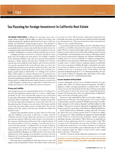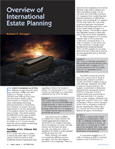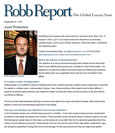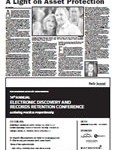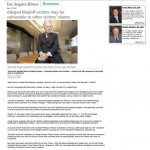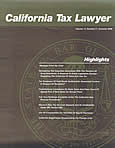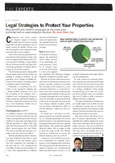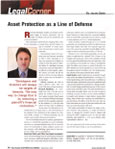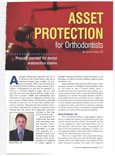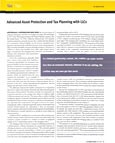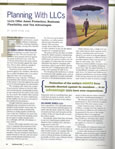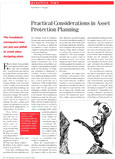Archive for February, 2013
State of the Art in Asset Protection
Thursday, February 28th, 2013Sophisticated Tax Strategies for Start-Ups
Wednesday, February 27th, 2013Asset Protection Planning
Friday, February 15th, 2013Asset Protection for California Residents
Thursday, February 14th, 2013![Book_Cover_[Asset-Protection-for-California-Residents]](http://lataxlawyers.com/wp-content/uploads/2013/02/Book_Cover_Asset-Protection-for-California-Residents.jpg) Asset Protection for California Residents
Asset Protection for California Residents
by Jacob Stein
The only book on asset protection planning specific to California residents. This book is a must read for any Californian who has assets that he wants to keep. Learn how to use limited liability companies, limited partnerships, various trusts, transmutation agreements, sophisticated offshore structures and many other planning tools to protect your home, retirement accounts, investments, rental real estate, business interests, intellectual property and any other asset that is valuable to you. The book focuses largely on California law and planning for California clients, but where appropriate covers the laws of other leading asset protection jurisdictions like Delaware, Nevada, Cook Islands, etc.
In addition to the substantive discussion, this book also takes a revealing look at the practical aspects of asset protection. Is it ever too late to plan? Is it safe to place assets offshore? How to pick the right structure for your client? What really works and what does not. Whenever possible, the author relates client case histories and anecdotes to readily illustrate what works and what does not work. The author is a practicing attorney specializing exclusively in asset protection planning, with many years of experience. He has represented over a 1,000 wealthy clients over the course of his career. He shares his extensive experience and knowledge of the law in an easy to read and understand manner.
A Lawyer’s Guide to Asset Protection Planning In California
Thursday, February 14th, 2013![Book_Cover_[A-Lawyers-Guide-to-Asset-Protection-Planning-in-California]](http://lataxlawyers.com/wp-content/uploads/2013/02/Book_Cover_A-Lawyers-Guide-to-Asset-Protection-Planning-in-California.jpg) A Lawyer’s Guide to Asset Protection Planning In California
A Lawyer’s Guide to Asset Protection Planning In California
by Jacob Stein
A Lawyer’s Guide to Asset Protection Planning in California is the first and only treatise on asset protection planning specific to California. A desktop reference guide that every attorney in California should have. In-depth coverage of the underlying substantive law and legal doctrines, with a review of applicable statutes and cases. Analysis of the most commonly used structures and planning obstacles. The book focuses largely on California law and planning for California clients, but where appropriate, covers the laws of other leading asset protection jurisdictions like Delaware, Nevada, Cook Islands, etc. In addition to the substantive discussion, this book also takes a revealing look at the practical aspects of asset protection.
Is it ever too late to plan? Is it safe to place assets offshore? How to pick the right structure for your client? What really works and what does not. Learn how to protect your clients’ assets from plaintiffs and creditors. Coverage includes planning with community property, domestic and foreign business entities, domestic and foreign trusts and retirement plans. Specific emphasis will be placed on protecting assets in a troubled economy, including protection from lenders and landlords holding personal guarantees. You’ll learn various ways, from the very simple to the very sophisticated, to protect specific assets common to all clients: houses, bank and brokerage accounts, rental real estate, businesses and professional practices and retirement plans.
[ Get it at Amazon.com ] [ ![]() Download a sample chapter - PDF 550KB ] [View the book website.]
Download a sample chapter - PDF 550KB ] [View the book website.]
Asset Protection
Thursday, February 14th, 2013![Book_Cover_[Asset_Protection_Legal_Guide]](http://lataxlawyers.com/wp-content/uploads/2013/02/Book_Cover_Asset_Protection_Legal_Guide.jpg) Asset Protection
Asset Protection
by Robert F. Klueger
As a business owner, you can’t prevent gold-diggers from bringing frivolous lawsuits against you. It’s relatively easy for someone to invent a hollow lawsuit and find a lawyer to present it. It’s not uncommon for the jury to give credence to the most ludicrous lawsuit on the assumption that it wouldn’t be in the court system unless it had merit.
You can’t change human nature or the jury system, and insurance isn’t always enough. However, you can assure that you are protected above and beyond your insurance coverage should you ever be put in this type of situation. With some careful planning and advance arrangements -experienced attorney Robert L. Klueger shows you how to legally position your assets so they are exempt from seizure or shielded from a creditor’s claims.
[ Get it at Amazon.com ] [ ![]() Download the first chapter - PDF 174KB ]
Download the first chapter - PDF 174KB ]
A Guide to Asset Protection
Thursday, February 14th, 2013![Book_Cover_[A_Guide_to_Asset_Protection]](http://lataxlawyers.com/wp-content/uploads/2013/02/Book_Cover_A_Guide_to_Asset_Protection.gif) A Guide to Asset Protection
A Guide to Asset Protection
by Robert F. Klueger
Partner Robert Klueger’s book, “A Guide to Asset Protection – How to Keep What’s Legally Yours”, has been the definitive guide on the subject for nearly a decade.
Its easy-to-understand pages contain a wealth of interesting and useful information on ways to preserve your hard-earned assets. It’s the result of his decades of experience helping people plan powerful and perfectly legal ways to protect their futures.
Asset Protection – A Technical Manual
Thursday, February 14th, 2013![Book_Cover_[Asset_Protection_-_A_Technical_Manual]](http://lataxlawyers.com/wp-content/uploads/2013/02/Book_Cover_Asset_Protection_-_A_Technical_Manual.jpg) Asset Protection – A Technical Manual
Asset Protection – A Technical Manual
by Jacob Stein
“Asset Protection Planning” by Jacob Stein is a technical manual on the subject used by attorneys and CPAs. It’s a detailed study of a number of key areas – the underlying substantive law of asset protection, fraudulent transfer and collection laws, and asset protection with foreign and domestic trusts, legal entities, for married couples and for retirement plans.
[ Download a copy of each chapter in our White Papers section. ]
Finally, Cliff Deal Provides Some Finality in Estate Planning
Thursday, February 14th, 2013LA Daily Journal, January 2013
On Jan. 1, 2013, Congress enacted the American Taxpayer Relief Act of 2012, the law that averted us all going over the “fiscal cliff.” The act ended a tortuous road that the estate tax and gift tax have followed for more than a decade.
Tax Planning for Foreign Investment in California Real Estate
Thursday, February 14th, 2013LA Lawyer, January 2013
THE RECENT CONFLUENCE of falling U.S. real estate prices and a weaker dollar, together with the flight of capital from Russia and China, has produced a significant demand for real estate in California, Florida, and Manhattan among foreign investors. This demand is fueled by the global perception that the United States is politically and economically stable (or at least more stable than the alternatives), has a transparent legal system that makes it easy for foreigners to invest in real estate and imposes no currency controls, making it easy to divest.
Expand Choices by Creatively Unwinding Irrevocable Trusts
Thursday, February 14th, 2013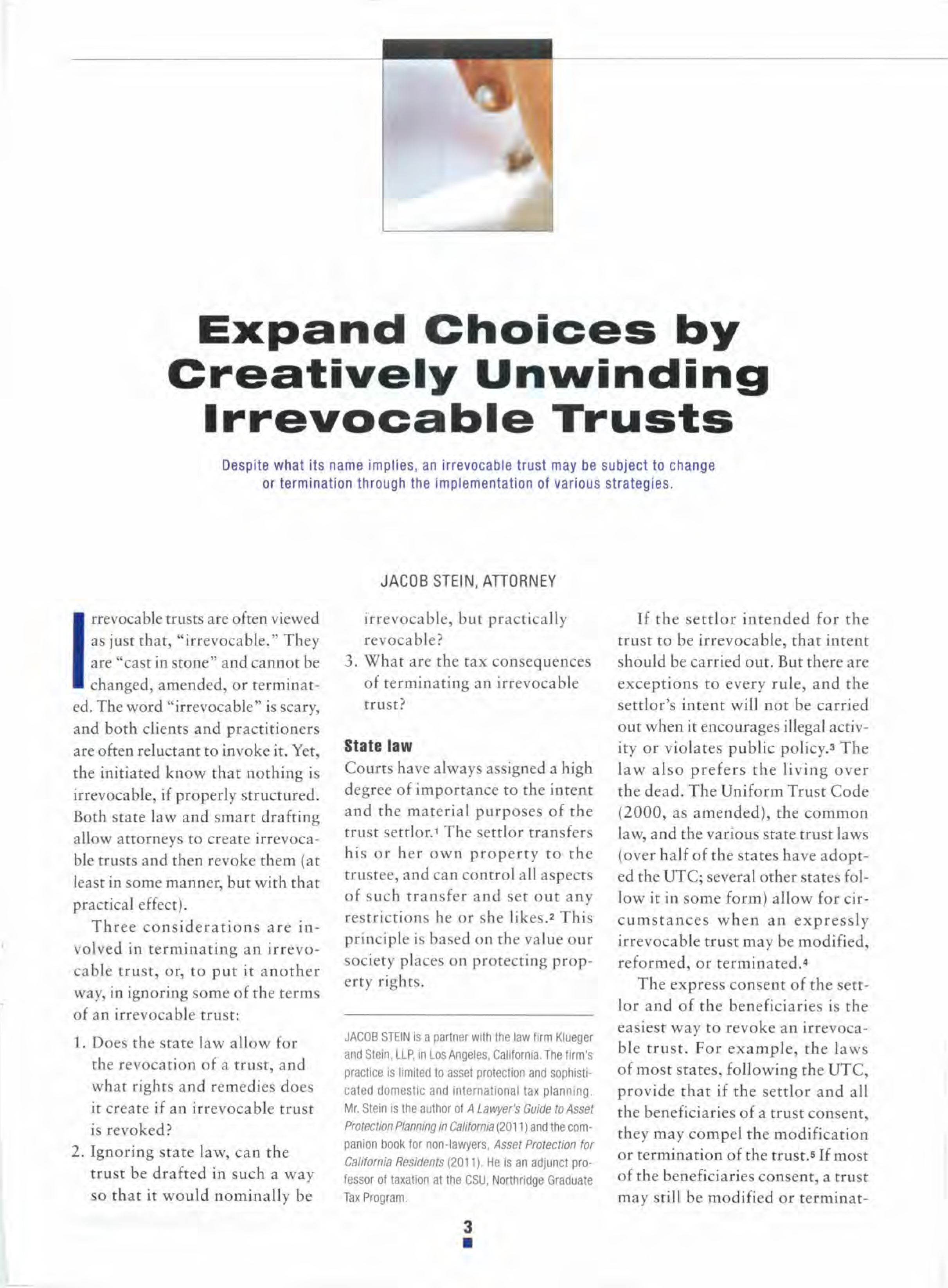 by Jacob Stein
by Jacob Stein
Estate Planning, December 2012
Despite what its name implies, an irrevocable trust may be subject to change or termination through the implementation of various strategies.
Overview of International Estate Planning
Thursday, February 14th, 2013Valley Lawyer, October 2012
ESTATE PLANNING IS OFTEN difficult enough when the client was born, resides and owns property in Tarzana. It can be infinitely more difficult if the client was born and/or resides and/or owns property in Tanzania. If the client contemplates relocating, either permanently or temporarily, from Tanzania to Tarzana, there are opportunities to be had, and pitfalls to be avoided—before the client’s tax status changes. This article explores the differences in the ways in which U.S. citizens, U.S. resident aliens (RAs) and non-resident aliens (NRAs) are subject to U.S. income tax and estate tax, and the estate tax planning opportunities for NRAs.
Jacob Stein Published in The Daily Journal
Thursday, February 14th, 2013The Emotional Consequences of Asset Protection
This year has been an emotional rollercoaster for our clients. As asset protection attorneys, we represent a great many people facing financial adversity. Our clients often come to us in a very depressed and disturbed state of mind. It is hard not to get emotionally involved in their problems…
Jacob Stein Interviewed by Robb Report
Thursday, February 14th, 2013McCourt Divorce Shines A Light on Asset Protection
Thursday, February 14th, 2013Los Angeles Daily Journal, September 2010
Asset protection has significantly gained in prominence over the past few years. The declining fortunes of real estate developers and investors facing personal guarantee calls, coupled with business owners teetering on the verge of bankruptcy, resulted in a boom for this industry.
Asset Protection May Risk Fraudulent Transfer Violations
Thursday, February 14th, 2013Estate Planning, August 2010
Last-minute asset protection planning can frequently run afoul of the fraudulent transfer laws. This article will help advisors determine when a transfer may be “fraudulent” and what would be the likely consequences of such a transfer to the client and to the attorney.
Holding On – Properly structured ERISA plans provide a powerful tool in asset protection planning
Thursday, February 14th, 2013Los Angeles Lawyer, December 2009
When contemplating a plan for asset protection, practitioners and their clients often focus on the most exotic approaches, such as foreign and domestic trusts, transmutation agreements, and limited liability companies. Indeed, they often overlook the fundamentals of asset protection, including exempt assets-those that cannot be seized by creditors because they are exempt under federal or state law. Any asset protection plan should begin with an inventory of the client’s exempt assets, which should in turn lead to an inquiry whether the client’s nonexempt assets can be converted into exempt assets.
Alleged Madoff Victims May be Vulnerable to Other Victims’ Claims
Thursday, February 14th, 2013Los Angeles Times, February 2009
When contemplating a plan for asset protection, practitioners and their clients often focus on the most exotic approaches, such as foreign and domestic trusts, transmutation agreements, and limited liability companies. Indeed, they often overlook the fundamentals of asset protection, including exempt assets-those that cannot be seized by creditors because they are exempt under federal or state law. Any asset protection plan should begin with an inventory of the client’s exempt assets, which should in turn lead to an inquiry whether the client’s nonexempt assets can be converted into exempt assets.
Tilting at Windmills
Thursday, February 14th, 2013Business Entities, May/June 2008
California’s Treatment of A Foreign Jurisdiction’s Series LLCs.
California Registration Requirements for Foreign LLCs
Thursday, February 14th, 2013California Tax Lawyer, Summer 2008
The question of California registration comes up often when foreign limited liability companies are used as holding companies for California legal entities, or own passive assets in California like bank accounts and non-income producing real estate.
Legal Strategies to Protect Your Properties
Thursday, February 14th, 2013Real Estate Investor, October 2007
Most plaintiffs and creditors simply give up the chase when confronted with an asset protection structure.
Asset Protection as a Line of Defense
Thursday, February 14th, 2013Real Estate Southern California, September 2007
Developers and investors will always be targets of lawsuits. The only way to change that is by removing a plaintiff’s financial motivation.
Asset Protection for Orthodontists
Thursday, February 14th, 2013OrthodontlcProductsOnline.com, April/May 2007
Although orthodontists represent only 7% of all dentists in the United States, they face a disproportionately large number of malpractice lawsuits. This is true for anyone in the medical field who performs a large number of procedures.
Asset Protection for Doctors
Thursday, February 14th, 2013Plastic Surgery Products Magazine, February 2007
This article provides a comprehensive overview of asset protection for doctors. It focuses on the most practical asset protection strategies and examines the most commonly used structures. For each asset type, different alternatives are discussed and compared.
The Importance of Trusts in Asset Protection
Thursday, February 14th, 2013California Trusts and Estates Quarterly, Winter 2007
In this well-received article, Jacob Stein examines the crucial role that trusts play in asset protection and advises on how trusts should be drafted to maximize their asset protection effectiveness. The article also includes a thorough examination of foreign trusts and recent cases in that arena.
A Practical Take on Charging Orders
Thursday, February 14th, 2013RIA, Business Entities Magazine, September/October 2006
One of the most comprehensive articles ever written on charging orders. The article examines charging order history, variances in state laws, uniform laws and various concerns.
Advanced Asset Protection and Tax Planning with LLCs
Thursday, February 14th, 2013Los Angeles Lawyer, June 2006
In this exhaustive article, Jacob Stein examines such issues as LLC charging orders, series LLCs, foreign LLC structures, drafting issues and tax planning concerns. This article is an exhaustive reference on many LLC issues.
Planning With LLCs
Thursday, February 14th, 2013California CPA, August 2005
From the time limited liability companies came into prominence, practitioners have been working to maximize their asset protection, business flexibility and tax advantages, among other benefits.
Tax-Free Exchanges and Fractional Interests: TICs, Tax, Go!
Thursday, February 14th, 2013Orange County Lawyer, August 2003
Jack was fast approaching his “golden” years, and following the advice of his attorney/CPA/financial planner was looking to diversify his only asset, a 30,000 square-foot shopping center. Having made his living off real estate, Jack was not interested in pork belly futures, blue-chip stocks or aircraft leases; hewas looking to diversify into real estate.
Practical Considerations in Asset Protection Planning
Thursday, February 14th, 2013Los Angeles Lawyer Magazine, July/August 2003
This article provides an extensive overview of commonly used asset protection techniques and common obstacles facing the asset protection attorney, including fraudulent conveyance laws.
Citizenship for Sale in the Caribbean
Tuesday, February 12th, 2013
Here is an interesting article from AP about citizenship for sale in the Caribbean. Most nations sell citizenship, or at least permanent residence with a path to citizenship (including the U.S. and many EU nations) – Caribbean nations make it very affordable. We have helped our clients obtain citizenship in various countries, mostly in East Caribbean. The need for a second citizenship is usually fueled by tax planning (i.e., the client is planning to surrender primary citizenship) or politics (if you may need to flee Russia or Saudi Arabia someday, you need a second passport). Costs and difficulty of obtaining second citizenship varies by country, but in all cases the most important consideration is the ability to travel using the second passport. For example, an individual holding a U.S. or a Schengen passport may travel most anywhere in the world without a visa. The same is not true for citizens of many Caribbean nations.
KINGSTON, Jamaica (AP) — Hadi Mezawi has never set foot on the Caribbean island of Dominica, has never seen its rainforests or black-sand beaches. But he’s one of its newest citizens. Without leaving his home in the United Arab Emirates, the Palestinian man recently received a brand new Dominican passport after sending a roughly $100,000 contribution to the tropical nation half a world away.
“At the start I was a little worried that it might be a fraud, but the process turned out to be quite smooth and simple. Now, I am a Dominican,” said Mezawi, who like many Palestinians had not been recognized as a citizen of any country. That passport will help with travel for his job with a Brazilian food processing company, he said by telephone from Dubai.
Turmoil in the Middle East and North Africa has led to a surge of interest in programs that let investors buy citizenship or residence in countries around the world in return for a healthy contribution or investment. Most are seeking a second passport for hassle-free travel or a ready escape hatch in case things get worse at home.
Nowhere is it easier or faster than in the minuscule Eastern Caribbean nations of Dominica and St. Kitts & Nevis.
It’s such a booming business that a Dubai-based company is building a 4-square-mile (10-square-kilometer) community in St. Kitts where investors can buy property and citizenship at the same time. In its first phase, some 375 shareholders will get citizenship by investing $400,000 each in the project, which is expected to include a 200-room hotel and a mega-yacht marina. Others will get passports for buying one of 50 condominium units.
“The more they fight over there, the more political problems there are, the more applications we get here,” said Victor Doche, managing director of another company that offers four condominium projects where approved buyers are granted citizenship in St. Kitts, which is less than twice the size of Washington D.C.
It’s impossible to say how many people have used the cash for citizenship programs. Officials in both countries declined to respond when asked by The Associated Press. “Why do I have to speak on that?” said Levi Peter, Dominica’s attorney general. “I have no explanation to give to AP.”
But Bernard Wiltshire, a former Dominica attorney general, said there were already around 3,000 economic citizens when he left government about a decade ago. The country now has roughly 73,000 inhabitants in all. “Investor visa” or citizenship programs are offered by many nations, including the United States, Canada, Britain and Austria. But the Caribbean countries offer a fast path to citizenship at a very low cost. The whole process, including background checks, can take as little as 90 days in St. Kitts. And there’s no need to ever live on the islands, or even visit. A foreigner can qualify for citizenship in St. Kitts with a $250,000 donation to a fund for retired sugar workers or with a minimum real estate investment of $400,000. The minimum contribution in Dominica is $100,000.
By contrast, a U.S. program allows visas for a $1 million investment in a U.S. business employing at least 10 people or $500,000 in designated economically depressed areas. The investor can apply for permanent residence in two years, and seek citizenship after five more. Demand in Canada is so great that the country stopped accepting new applications in July. A Dominica passport holder can travel without a visa to more than 50 countries, while a St. Kitts passport provides visa-free travel to 139 countries, including all of the European Union. That’s a big deal to people in countries from which travel is restricted or whose passports are treated with suspicion.
Critics say the programs undermine the integrity of national passports and have security risks. While there are no known cases of terrorists using the programs, experts say that’s a possibility with many visa arrangements anywhere. “No level of scrutiny can completely guarantee that terrorists will not make use of these programs, just as background checks cannot eliminate the risk that dangerous individuals will not enter the country (the U.S.) on tourist visas, as students or as refugees,” said Madeleine Sumption, a senior policy analyst at the Washington-based Migration Policy Institute.
Canada imposed visa requirements on Dominica citizens a decade ago after complaining that suspected criminals had used island passports. And in 2010, Britain said it was considering visa requirements for Dominicans, prompting the island to review its 20-year-old economic citizenship program. Dominica never publicly released the results of its review and Britain took no action.
St. Kitts closed its program to Iranians in December 2011, shortly after Iranian students stormed the British Embassy in Tehran. Iranians had formerly been a major source of applicants, according to Doche. Some locals worry the programs could get out of hand if conditions worsen abroad. “There could be a flood of people with our passports relocating here,” said Dominica’s Wiltshire. “What are we going to do then? Really, this program must be halted. It’s dangerous to us and dangerous for our neighbors.” St. Kitts opposition leader Mark Brantley said the citizenship program was bringing much needed revenue to the debt-swamped islands, but he said there should be better oversight and public accounting. “We do not see that sufficient controls are currently in place to ensure that bad people, for want of better language, do not get access to our citizenship,” he said.
It’s not just economic refugees who are interested in the programs. American Neil Strauss wrote of securing citizenship in St. Kitts in his 2009 book on survivalist preparedness, “Emergency: This Book Will Save Your Life.” “The same way we have a backup drive for our computer in case the hard drive explodes, I just felt like I wanted a backup citizenship in case the same thing happened to my country,” Strauss said during a phone call from his home in Los Angeles. Like most economic citizens of St. Kitts, he rents out his island property.
Some other struggling Eastern Caribbean islands are looking at adopting the St. Kitts model.


